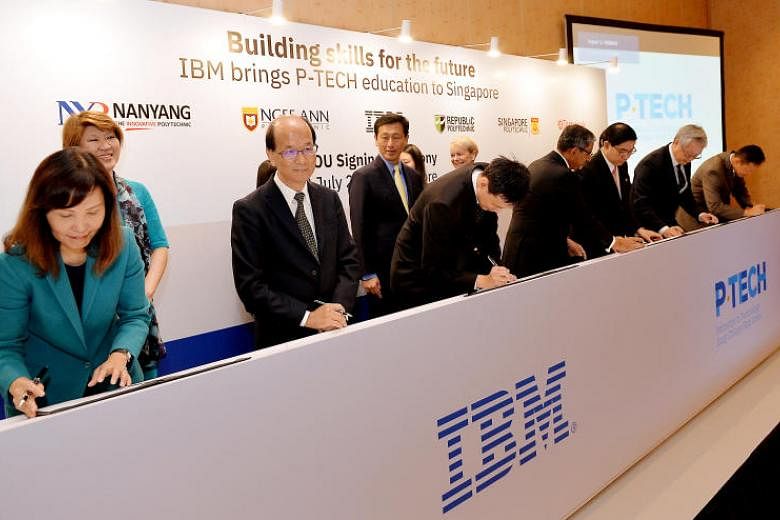SINGAPORE - About 40 first-year students at the Institute of Technical Education (ITE) next year will have a chance to take part in a ground-breaking mentorship programme involving industry experts.
The mentors will be with the students from day one to when they get their diploma, either in one of the five polytechnics or through an ITE Work-Learn Technical Diploma.
While workplace learning already takes place in ITE, this initiative is more in depth and concerted while also providing additional opportunities such as job shadowing and workplace challenges on top of the typical internships.
It will last from five to seven years, depending on whether students pursue their Higher Nitec in between their Nitec and diploma.
The programme, which is called P-TECH or Pathways in Technology Early College High-Schools, will be available to ITE students in the information and communication technology (ICT) and other science, technology, engineering and mathematics fields.
Tech giant IBM is facilitating the entire programme, providing mentors and opening up its offices to students, and getting corporate partners on board.
Similar initiatives are underway in the United States, Morocco, Australia and Taiwan.
Planning for the programme here began in January with a memorandum of understanding signed between ITE and the five polytechnics at the World Cities Summit on Monday (July 9).
"The urgent need for skilled talent is a global phenomenon and one that IBM has been keenly aware of," said Ms Harriet Green, IBM Asia Pacific chief executive and chairman.
"Here in Singapore, we have 30,000 too few security analysts - 30,000 in the most skilled workplace in the entire world!"
The programme will have to adapt to the local education environment, said Mr David Raper, head of IBM's Corporate Citizenship team in Asia Pacific and Greater China.
"It works with the existing education system, and does not replace it. We will work with the Singapore curriculum, especially the Work-Learn Technical Diploma which is quite a unique qualification and way of learning."
IBM will work with partners to provide mentoring. So far it has Citibank on board, with a few other companies in discussion, said Ms Green.
She noted that IBM has been a "proactive and positive employer of people that come out of P-TECH", and that partners too will prioritise individuals in the programme when hiring.
The programme looks to equip students with the necessary skills for what are called "new collar jobs" - roles in the technology industry's fastest growing fields, such as cybersecurity, cloud computing and digital design.
These may not require a university degree, but a specific skillset instead, said Mr Raper.
ITE chief executive Low Khah Gek said the workplace learning opportunities will let students understand the specific areas of fields they can specialise in.
As of now, ITE students do internships in the second year, but under the P-TECH programme, they will undergo workplace exposure from year one, she said.
She added that the programme looked to cater to "students from more challenging circumstances who have potential, but may need an adult mentor to motivate them and inspire them to learn".
"After the students enter the school, we will take the first two to three months to observe their aptitude, attitude and passion for their sector, and how much they want to push themselves to learn. Grades are not the main criteria," said Ms Low.
Education Minister Ong Ye Kung said on Monday that the programme will strengthen workplace learning opportunities which are "becoming a critical part of education and training".


